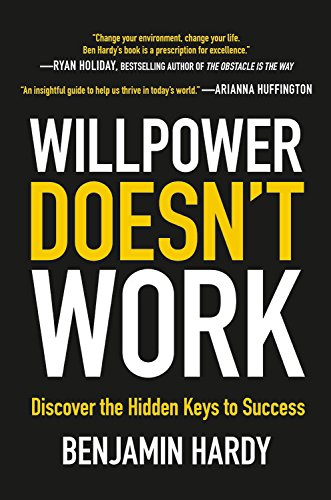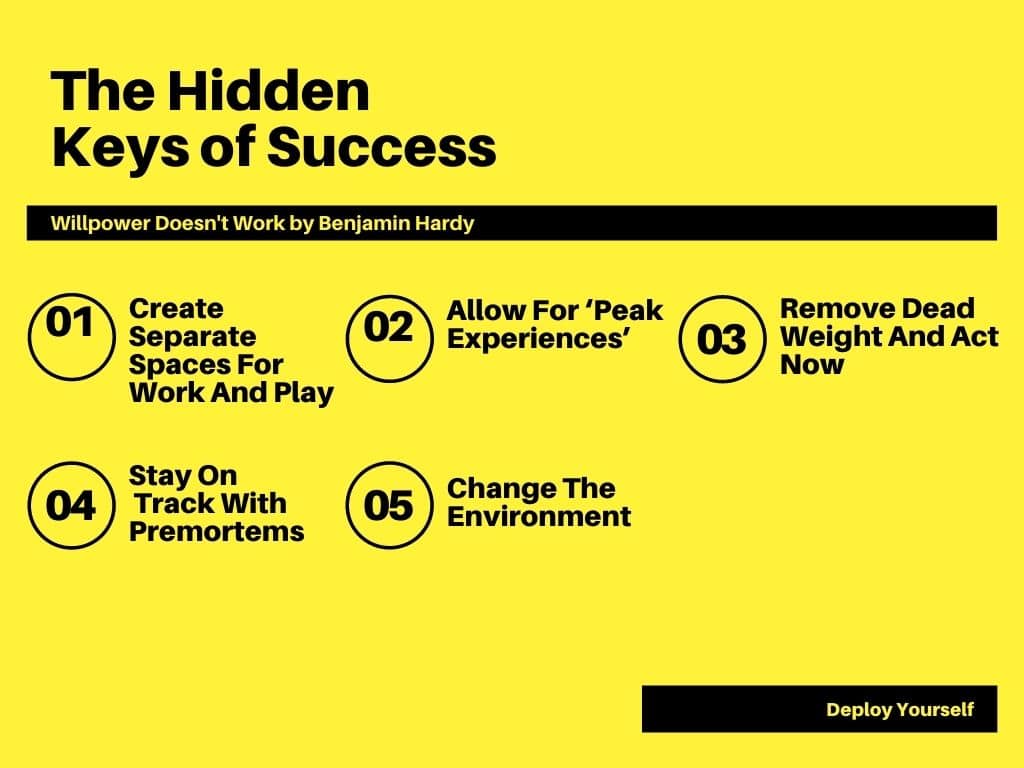Willpower Doesn’t Work (2018) draws on the premise that willpower isn’t the answer to success. Benjamin Hardy, the author, describes that focussing on changing the environment to achieve a goal rather than relying only on willpower is a better way of winning in life.
It is a widely accepted belief that we need willpower to accomplish our goals. Many books have been written about the positives of willpower and how one must harness it to succeed in life. Having willpower is a good thing, no doubt about that. But exercising willpower is no easy task, and the author suggests other ways to make it easier to achieve your goals.
Constantly reminding ourselves to exercise self-control is exhausting and it saps our energy. Before we know it, our willpower is weakened, and we give up. We must start the cycle of mustering willpower again, exercising self-control, and pushing harder than before. A cycle, that often leads to failure and giving in to short term temptations and instant gratifications.
How do we break this cycle? What if there is a way to achieve goals without needing willpower? Benjamin Hardy gives the following examples in the book to explain the same.
Example 1: The Obesity Epidemic

What is causing the obesity epidemic all over the world? Statistics show that most people in the world will suffer from obesity by 2025. What was different, say about 50 years ago? How did the general population remain fit and healthy, and not have so many lifestyle diseases? Did they have the willpower?
The answer is obviously not. What’s changed since then is our environment. Most of us sit at our desks all day and do work which hardly require any physical movement. And fast food and pre-packaged food is all the more available today, leading to convenience but also binging on unhealthy food. As the author puts it, it is our environment that has encouraged our weight gain, not a lack of willpower.
Example 2: Darwin’s Theory of Natural Evolution and Domesticated Evolution
Darwin’s theory of evolution states that we adapt to our environment to survive. He gives examples of natural evolution and domestic evolution. Natural evolution occurs when animals adapt to their environment in the wild.
Domesticated evolution refers to creating environments to influence adaptation to what humans desire. We have designed environments to domesticate animals. For example, we use chemical hormones for fatter livestock and enhance their feed. Their bodies have now adapted to those environments.
Similarly, we have domesticated ourselves to adapt to a sedentary lifestyle. Moreover, our food habits have become unhealthy, and we have adapted ourselves – physically and mentally – to our current lifestyles.
The author says we must focus on creating a healthy environment so that we have no choice but to adapt to it in a way we desire. When you change your environment, such as surrounding yourself with different people, your thoughts and emotions change. This can be applied to any area of our lives where we seek better results. Let us see how to do it.
1. Create Separate Spaces For Work And Play
Today, the lines separating work and play have blurred. Our offices have come into our homes. We don’t realize it, but it is a challenging task to keep ourselves from the distractions that are a result of such a mixed environment.
It is important to have a clear differentiation between work and play environments, where the play environment is created for relaxation and having a stress-free time, and the work environment is devoid of any distractions and is dedicated to only work.
Healthy levels of stress can have its fair share of benefits and can help one reach their full potential. Therefore, one should create a work environment that removes all distractions and enables one to perform and maximize productivity.
2. Allowing For ‘Peak Experiences’
We often get stuck in our environment and experience a mind-block. This can keep us from performing well, as well as achieving our goals. Changing the environment can lead to inspiration and a new sense of purpose. It has been proven that fresh ideas and creative breakthroughs come in the weirdest of places, like while taking a shower.
A ‘peak experience’ is where one experiences a heightened sense of perception leading to clarity in thought. We can create these breakthrough moments by changing our environment and developing a habit of creating these experiences by taking regular breaks like going out to take a walk in nature or doing something else for a while.
3. Remove Dead Weight And Acting Now
What is deadweight? Deadweight is anything that shifts your focus and wastes your time from things that are needed to reach your goal. Often, we indulge ourselves in succumbing to the distractions of deadweight. These could be unimportant tasks that we give importance to or even games on our smartphones. Having too many choices at hand is also deadweight. It leads us to make uncertain decisions and focus unnecessarily on the details of all those choices.
By making the decision to remove dead weight from our lives, we simply take away the temptation to succumb, and the need for willpower and self-control. To remove dead weight, it is essential to act now. Procrastinating in doing that will only throw us back into the vicious cycle of willpower, self-control, and failure.
For example – Is there food in your fridge that you know is unhealthy? Throw it out now – it’s dead weight. When you do this, decision making becomes easier.

4. Stay On Track With Implementation Intentions
Implementation intentions (or premortems, as Daniel Kahneman calls them) is a strategy of foreseeing failure of a future goal to analyze what could cause it. Analyzing the causes of failure helps us to make better decisions and avoid failure.
Implementation intentions can also help identify the threshold of quitting. If one can identify when they want to quit, they can try to push harder to achieve their goal until they reach that threshold.
5. Changing The Environment By Use Of Forcing Functions
Exercising willpower to achieve a goal requires forcing yourself, and nobody likes that. People prefer to do things voluntarily, and at their own pace. This leads to the vicious cycle of willpower, self-control, and failure.
Forcing functions are self-imposed changes in our environments to align us with our goals. They can be used positively to change the environment rather than requiring willpower. Forcing functions factor in non-negotiable changes in the environment that give us the push to achieve our goals rather than using willpower.
The author Benjamin Hardy gives the example that if you want to be more present with your family after work, you should leave your phone in the car. That way, taking calls and answering texts isn’t even an option, and this is a forcing function.
Key Message
We can think creatively, use implementation intentions, forcing functions, and remove dead weight from our environment to bring about desirable changes. Changing our environment results in the effective and timely achievement of goals without needing willpower.
